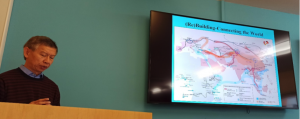You are here
- Home
- Building a BRI Network at The Open University
Building a BRI Network at The Open University
5 November 2019

China’s ambitious Belt and Road Initiative (BRI) is an area of growing interest. In this blog political economist Dr Lorena Lombardozzi outlines an Open University workshop exploring a range of issues relating to the BRI, and laying the foundations for a new research network.
On Tuesday 15 October 2019 at The Open University, with the support of the Strategic Research Area in International Development and Inclusive Innovation, I organised a workshop on The Belt and Road Initiative (BRI) – The role of China in contemporary International Development.
The workshop was structured in an interdisciplinary way across Economics, Development, Geography and Sociology. It has a range of issues connected to the role of China in global development and the relevance of the Belt and Road Initiative, which is the Chinese government’s ‘grand strategy’ for connecting China to other parts of Asia, East Africa, the Middle East and Europe. Despite being launched in 2013 we know little about the outcomes of this huge and disparate initiative that ultimately aims to link over 60 countries in what the Chinese see as a re-invention of the ancient ‘silk road’.
In the first session, Alan Shipman (Economics at The Open University) discussed the role of Chinese MNCs for technological transfer in emerging markets. The paper from which his talk entitled China's technology transfer: knowledge broking or IP theft? is derived, can be found here. Alan Shipman and his co-authors Huaichuan Rui and Miao Zhang argue that, according to empirical evidence, the transfer of technology is realised through a bi-directional and negotiated mechanism.
I, Dr Lorena Lombardozzi (Economics at The Open University) presented a scoping research paper called From socialist accumulation to BRI: challenges of structural transformation in the opening post-Soviet space. I highlighted, through the case of Uzbekistan, how the BRI could represent a potentially vital source of ‘patient capital’ for investment in infrastructure and manufacturing development for the national development.
In the second session, guest speaker Professor Xiangming Chen (Global Urban Studies and Sociology at Trinity College, Hartford, Connecticut, USA) discussed from a geographical perspective China’s Reconnection to Europe via the BRI: The China-Europe Freight Train and its impact in attracting technology, employment opportunities and shaping the cities along the Belt and Road. A related podcast is available here.
In the last session, the two speakers delved into the impact and mechanisms of Chinese infrastructural investment in two case studies, Ethiopia and Pakistan. Dr Frangton Chiyemura (DPP at The Open University) presented a paper Contextualising African agency in Ethiopia-China financing and developing of Adama wind energy infrastructure, based on fieldwork undertaken as part of his doctoral research. He argued that the Ethiopian government was able to broker the deals, structure the financing terms and shape the implementation and management processes of the wind farms. Finally, Dr Tayyab Safdar (Centre of Development Studies & China Centre at University of Cambridge, UK) presented his preliminary findings on his post-doctoral research Local agency in Belt & Road Initiative Projects: The case of the Main Line – 1 railway project in Pakistan. Through evidence based on his extensive data, he also argued for the need to more thoroughly investigate the agency of the state recipients and understand the local barriers in engaging with Chinese firms.
Join the BRI Network
The workshop was an opportunity for all the speakers and participants to pitch ideas and exchange empirical insights on the different geo-political articulations as well as local and global challenges attached to the BRI. Many commonalities but also differences were identified across the different case studies analysed. These can be summarised as:
- The BRI is an umbrella term that includes current but also pre-existing Chinese projects and investments across the world;
- BRI-related activities are very heterogenous and involve different Chinese actors, both national and regional but also private and public;
- The economic and political impacts are still hard to measure and have to be understood in their context specificity.
Researchers and policymakers working on the BRI are invited to fill this short form (Link here) if they want to be part of a BRI Network. The BRI Network connects experts working in the different regions, disciplines and across topics relating to the BRI. If you would like further information, please send an email to Lorena.lombardozzi@open.ac.uk
Photo shows Professor Xiangming Chen's presentation
Share this page:
Contact us
To find out more about our work, or to discuss a potential project, please contact:
International Development Research Office
Faculty of Arts and Social Sciences
The Open University
Walton Hall
Milton Keynes
MK7 6AA
United Kingdom
T: +44 (0)1908 858502
E: international-development-research@open.ac.uk
.jpg)